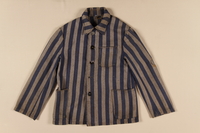Overview
- Description
- Contains documents and photographs illustrating the experiences of Leah (Lonia) Kirschenbaum and Uscher Mossak (Mosak) and their internment in concentration camps and displaced persons camps in Poland and Austria.
- Credit Line
- United States Holocaust Memorial Museum Collection, Gift of Lonia Mosak and Doris Lazarus, in memory of Oscar Mosak, husband and father
Physical Details
- Extent
-
2 folders
Rights & Restrictions
- Conditions on Access
- There are no known restrictions on access to this material.
- Conditions on Use
- Material(s) in this collection may be protected by copyright and/or related rights. You do not require further permission from the Museum to use this material. The user is solely responsible for making a determination as to if and how the material may be used.
Administrative Notes
- Holder of Originals
-
United States Holocaust Memorial Museum
- Legal Status
- Permanent Collection
- Provenance
- Donated to the USHMM in 2017 by Doris Mosak Lazarus.
- Record last modified:
- 2023-10-05 08:02:47
- This page:
- https://collections.ushmm.org/search/catalog/irn561537
Download & Licensing
- In Copyright - Use Permitted
- Terms of Use
- This record is not digitized and cannot be downloaded online.
In-Person Research
- Request 7 Days in Advance of Visit
- Plan a Research Visit
-
Request in Shapell Center Reading Room
Bowie, MD
Contact Us
Also in Kirschenbaum and Mosak family collection
The collection consists of a concentration camp uniform jacket and documents and photographs illustrating the experiences of Leah (Lonia) Kirschenbaum and Uscher Mossak (Mosak) and surrounding their internment in concentration camps and displaced persons camps in Poland, Austria.

Concentration camp uniform jacket worn by a Polish Jewish inmate
Object
Blue and gray striped concentration camp uniform jacket worn by Uscher Mosak while imprisoned in Auschwitz, Mauthausen, and Ebensee concentration camps from December 17, 1942 to May 6, 1945. On September 5, 1939, the German army occupied Uscher’s town, Plonsk, Poland. After May 1941, Uscher, wife Perla, and children, Mirjam and Hirsz, were interned in the closed ghetto. In December 1942, Uscher and his family were transported to Auschwitz and separated. He was assigned prisoner number 84225 and was a tailor in the camp. On January 18, 1945, as Soviet forces approached, Uscher was sent on a forced march to Mauthausen in Austria, then transported to Ebensee. On May 6, Uscher was liberated by US soldiers and transferred to Bad Ischl displaced persons camp. He learned that his wife and children had been killed upon arrival at Auschwitz. Four of his five brothers were killed fighting in the Soviet Army. In November 1948, Uscher and his second wife, Lonia, immigrated to the United States.
Lonia Mosak identity card
Document
A postwar identity card issued to Lonia Mosak stating she is a former victim interned in concentration camps Auschwitz in Poland and Ravensbrueck in Germany.



